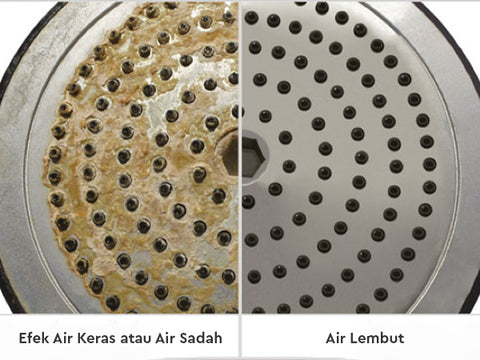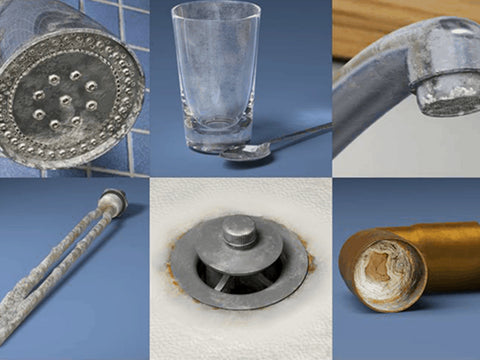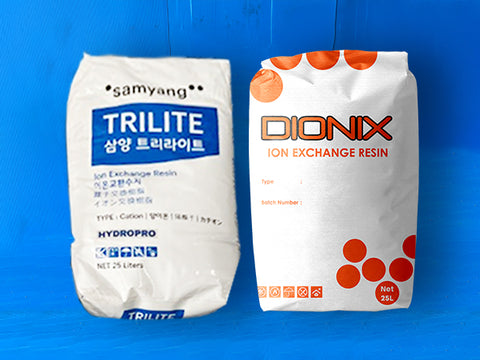Hard water or hard water is a type of water that is high in minerals, especially calcium and magnesium. The presence of these minerals not only characterizes the water but also affects many aspects of daily life, from household use to health effects. Understanding the characteristics and effects of hard water is important, as it affects the quality of water we use every day. Whether for bathing, washing, cooking or direct consumption, the quality of water can affect our health and comfort as well as the lifespan of water-using appliances. With the right knowledge about hard water, we can take the necessary steps to address it, ensuring that we are using water that is not only safe but also healthy for the whole family.

What is Hard Water?
Hard water is water that has a high mineral content. The process of hard water formation occurs when water flows through gypsum or limestone deposits, where it absorbs minerals such as calcium and magnesium. It is this mineral content that gives the water its "hard" characteristic. This definition of hard water is important to understand, as aside from affecting the efficiency of household appliances such as washing machines and water heaters, it can also potentially be detrimental to the health of our skin and hair.
More than that, hard water can affect everything from the taste of drinking water to the effectiveness of cleaning processes. Water with a high level of hardness requires more soap and detergent to create suds, which can ultimately increase household expenses. Therefore, understanding how to identify and address hard water is an important step towards maintaining quality of life as well as efficient water usage in daily activities.

How to Recognize Hard Water?
There are several signs that can indicate the presence of hard water in your home, including:
-
The appearance of white scale on appliances and equipment that frequently come in contact with water. This scale forms due to the deposition of minerals that hard water leaves behind after it evaporates.
-
Soaps and shampoos have difficulty lathering when mixed with water, as the minerals in hard water react with the soap, reducing its ability to lather.
-
Skin and hair feel dry after showering. This happens because the minerals in hard water can strip skin and hair of their natural moisture, leaving them feeling dry and stiff.
-
Clothes become rough and colors fade quickly after washing, because the minerals in hard water damage clothing fibers and reduce the ability of soap to clean effectively.
In addition to the above signs, hard water can also lead to lower energy-using efficiency in your water heater. Minerals accumulated inside the heater tank can hinder heat transfer and force the heater to work harder, ultimately increasing energy consumption. The appearance of problems in the plumbing system, such as blockages and corrosion, can also be another indicator of the presence of hard water, which can reduce water flow and require costly repairs. Paying attention to these symptoms can help you identify hard water problems early and take the necessary measures to address them.

Read also:
Understanding Hard Water: Definition, Types, and Uses
Understanding Hard Water.
The Impact of Hard Water on Everyday Life
Hard water not only causes inconvenience in daily activities but can also cause damage to household appliances such as washing machines and water heaters. The presence of excess minerals in hard water can shorten the lifespan of appliances by forming a hard film in them, which hinders efficiency and increases maintenance and replacement costs.
In addition, hard water can affect the health of skin and hair, causing them to become dry and unhealthy. The minerals in hard water can strip skin and hair of their natural moisture, leaving them feeling stiff and dry. This not only impacts appearance but can also lead to skin conditions such as eczema and other skin irritations that require medical treatment.
The impact of hard water on daily life also extends to the efficient use of cleaning products and soaps. You may find that you need to use a greater amount of soap, shampoo, or detergent to achieve the same level of cleanliness compared to using soft water. This is not only inconvenient but also adds to the cost of monthly spending on these items.
Furthermore, hard water can damage piping systems and fittings due to mineral buildup that can cause clogging and corrosion of pipes. This not only reduces water pressure but can also cause leaks and serious damage to your home's infrastructure, ultimately requiring expensive repairs.
Tackling hard water issues is not just about avoiding inconvenience or material damage, but also about protecting the health and well-being of your family and maintaining efficient and sustainable use of resources in your home.

Watermart's Role in Overcoming Hard Water
Watermart is active in offering efficient solutions to hard water, focusing on providing quality products such as water filters and purification media. We invite you to consult us for your water treatment needs, with a selection of products such as ion exchange resin and cationic resin specifically designed to reduce excess minerals and scale issues. Our eco-friendly and sustainability-focused approach ensures that our solutions not only address hard water but also support access to cleaner, healthier water for everyday life and commercial applications.
Get quality technical support and customer service from Watermart for effective and sustainable implementation of hard water solutions. Contact us via Whatsapp and e-mail for more information.

.png?width=50&height=50&name=Logo_Watermart_Perkasa-removebg-preview%20(1).png)


